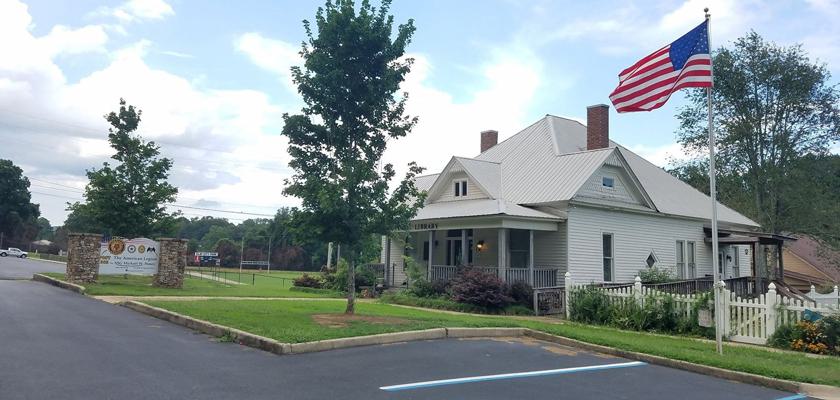As the nation pauses to reflect on the ultimate sacrifice made by generations of heroes, it is important to remember the service of their loved ones on the home front, particularly those whose countless prayers and sleepless nights ended with news of loss.
For Diane Waller’s family, the tradition of service and sacrifice traces back to the founding of the United States.
“My family has been a strong military family from the inception of this nation, so it goes way back,” said Waller.
Now she continues the service in honor of her family, particularly her husband, Charlie, a veteran who she calls her “greatest hero.”
The couple joined the American Legion Post 205 a few years prior to Charlie’s passing on December 7, 2020. After learning there was no local chapter of the American Legion Auxiliary at the post, Waller began researching the criteria, and before she knew it, she became president of the new chapter.
The American Legion Auxiliary is comprised of family members of American Legion members, and the group seeks to support veterans, active military and their families. Their website states, “We know that military service is a sacrifice for the whole family, so ALA members quietly look for ways to ease the burden…If we don’t have the resources, we connect military families with our partners who do.”
Waller currently serves as the President of the Auxiliary Unit 205, based at the American Legion SSG Michael W. Hosey Post 205 for Clay-Trussville.
John Burke is the Director of the Sons of the American Legion and Riders of the American Legion at Post 205, and he has worked with Waller for several years.
“Diane is a great lady and what she does, she does from the heart,” Burke said. “Her and her husband were great assets. We loved Charlie, and we all mourned him when we passed, and Di has always taken us in like family.”
As their national organization describes, “American Legion Auxiliary members are nurturers. We take care of others – especially veterans, military, and their families -- and we always put service above self.”
“That’s one of the pillars of the American Legion is community, and you’ve got veterans out there, older veterans out there and a lot of us just try to help out people where we can,” said Burke.
Waller said her auxiliary went through a growth spurt after its founding, but then the pandemic hit.
“After we had our post dedication, after we had been doing so well, it seemed like we were reaching our prime and then the pandemic hit, which knocked us out of the water,” Waller said. “Nobody knew what to expect. We didn’t know this was going to be an ongoing, lingering pandemic, but then everything around us was folding, shutting down.”
The auxiliary responded to the pandemic in just the way one would expect.
“All across the board in our state, we said ‘What can we do to help?’ because that’s what we do,” said Waller.
Although they were able to persevere through the start of the pandemic, Waller says the restrictions took a toll.
“Being shutdown long as we were, it hurt our unit because over time people were afraid to come out of their homes; they get fearful,” Waller said. “It’s easy to forget what your purpose is supposed to be, but we’ve had some great ladies trying to work really hard and encourage each other to get back into doing what we’re doing - what we’re designed to do - and that’s serve our country, serve our veterans.
“They were in a routine of doing meetings, and that routine got changed,” Burke said. “Now, it’s people getting back to it. It’s a gradual process, but I think we’re on the way.”
While they may be on their way, according to Waller, there is a real need for new and active members.
“Going forward, working membership is key,” Waller said. “So many programs are in place, but we need that manpower so I’ve been making sure the community knows that we have the post there.”
While a focus of the group is certainly serving veterans, the auxiliary members understand better than anyone the challenges faced by families of those currently serving, and they try to address the needs of both.
“It’s important to be able to stay in contact with military families who are struggling when their loved one is deployed,” Waller said. “There is a lot of trauma that can hit, so that’s where you can step up and make sure the young military families have what they need.
“It’s most important to make sure those programs are in place that can help when they are struggling with certain things. We try to push those programs into place that will help our vets get that needed care for our veterans who might not know what benefits are available.”
Waller advises anyone interested in starting an auxiliary to reach out to their local post.
“If there is a post across the nation that does not have an active aux, they should reach out to the post commander, who can advise on how to get one going,” said Waller.
For both Waller and Burke, it all comes back to family.
Burke said, “I do it for my father who served in the US Navy. It’s my way of trying to give back to the veterans and the community that I’ve been blessed to be a part of.
“We’ve all got to look out for each other.”
“We’re a family; we’re a Legion family,” said Waller.
To connect with the author of this story, email sean.taylor@1819news.com or on Twitter @morninganthem.
Don’t miss out! Subscribe to our newsletter and get our top stories every weekday morning.









